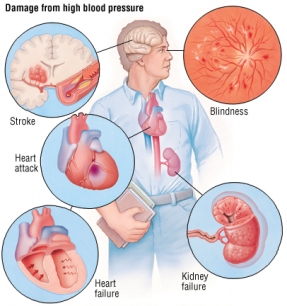
On the occasion of world hypertension day falling on 17th May 2015 Metro Hospital Cardiologist Team share & answer his views on high blood pressure.
For all above 30-35 years of age they must know their important health number-
The theme for 2015 is Know your Number.
1. What causes high blood pressure?
While the cause of high blood pressure in most people remains unclear, a variety of conditions - such as doing no exercise, high salt diet, obesity, older age and genetics-can lead to hypertension. Disease of kidney, aorta, and adrenals can also cause high BP.
2.What are systolic & diastolic blood pressure?
The blood pressure reading is measured in millimeters of mercury (mmHg) and is written as systolic pressure-the force of the blood against the artery walls as your heart beats - over diastolic pressure - minimum blood pressure between heartbeats. For example, a blood pressure reading is written as 120/80mmHg, or "120 over 80". The systolic pressure is 120 and the diastolic pressure is 80.
3. What is normal blood pressure?
Blood pressure measurements can be classified as:
4. What health problems are associated with high blood pressure?
Several potentially serious health conditions are linked to high blood pressure, including:
5. How do I know if I have high blood pressure?
Most of the time high blood pressure usually doesn't have any symptoms, so you usually don't feel it. For that reason, hypertension is usually diagnosed by a health care professional on a routine visit. This is especially important if you have a close relative who was hypertensive or you yourself have risk factors for it.
If your blood pressure is extremely high, you may have unusually strong headaches, chest pain and heart failure (especially difficulty breathing and poor exercise tolerance). If you have any of these symptoms, seek medical advice immediately.
6. What is the treatment for high blood pressure?
High blood pressure treatment usually involves making lifestyle changes and, if necessary, drug therapy. Lifestyle changes for high blood pressure includes:
High blood pressure drugs include Angiotensin-converting enzyme (ACE) inhibitors, Angiotensin receptor blockers, diuretics, beta-blockers and calcium channel blockers etc.
7. What type of diet should I follow if I have high blood pressure?
A healthy diet is very effective at lowering high blood pressure.
The following steps can also help:
8. When should I seek medical advice about high blood pressure?
If you are diagnosed with high blood pressure, it's important to see your doctor on a regular basis. He or she can answer your question during these visits.
However, there may be other times when you may need to speak to your doctor. For instance:
If you aren't responding to the prescribed treatment and your blood pressure is still high.
If you are having any side effects from the blood pressure medication. If this happens, your doctor may wish to adjust the dosage or put you on another medication.
9. Are there any drugs that cause high blood pressure?
Some drugs that you take for another condition may cause high blood pressure. These include amphetamines, corticosteroids, hormones (including birth-control pills), migraine medications, cyclosporine and erythropoietin & many pain killers.
Also, many over-the-counter medications that contain pseudoephedrine and ephedrine (for example, allergy, cold and cough medication and appetite suppressants) can cause high blood pressure.
Don't stop taking any prescribed medication, including high blood pressure drugs, on your own without talking to your doctor.
10. Does stress cause high blood pressure?
Many people do think that stress can cause high blood pressure, particularly long term stress at work or at home. Stressful situations can cause your blood pressure to go up in the short-term, but it will come back down once that stress has gone. Long-term stress is not thought to cause high blood pressure on its own. However, if as a result of your stress you also have an unhealthy lifestyle, drink alcohol excessively and being overweight for example, this may have an effect on your blood pressure.
11. If I have high blood pressure, will my children have it?
High blood pressure does run in families and it is even more important that if you have high blood pressure that you help your children to lead a healthy lifestyle too. If your children follow the same diet that you should be able to reduce their own risk of developing high blood pressure too.
We want to convey you all that you must know your health numbers and especially when you are a high risk patient, ie with high BP, uncontrolled Blood Sugar & Family history of any chronic disease.